Do you ever find yourself wondering how long should I consider a single business day? Whether you are trying to estimate a timeline for a project or working out staff hours and overtime payments, it can be confusing to understand how much each day truly represents in the work world. Learning this information is essential if you want your business and employees to succeed, so let’s take some time now to dive into the details of what constitutes a business day!
What is a business day?
A business day is any day of the week when businesses are typically open and operating. It varies from company to company, however Monday through Friday are generally considered business days in most countries around the world. A business day is used as a measurement of time in terms of commerce and financial transactions, such as transfers and deliveries. Typical business hours for a business day are 9:00 am to 5:00 pm. For example, when planning a shipment, one may choose to use a two-business day process that means orders placed before a certain cutoff that will received within 48 hours. This term can also be applied to other services such as loans or banking transactions where processing times are based on the number of business days stated.
Table of Contents
- What is a business day?
- Why is it important to know what a business day is?
- What is end of business (EOB)?
- How long is 1 business day?
- How long is 2 business days?
- How long is 3 business days?
- How long is 4 business days?
- How long is 5 business days?
- How long is 6 business days?
- How long is 7 business days?
- How long is 8 business days?
- How long is 9 business days?
- How long is 10 business days?
- How long is 11 business days?
- How long is 12 business days?
- How long is 13 business days?
- How long is 14 business days?
- How long is 15 business days?
- How long is 21 business days?
- How long is 1-2 business days?
- How long is 2-3 business days?
- How long is 3-5 business days?
- How long is 4-5 business days?
- How long is 5-7 business days?
- How long is 7-10 business days?
- How long is 14-21 business days?
- How many business days in a year?
Why is it important to know what a business day is?
Knowing what constitutes a business day helps businesses better manage their operations by giving them an accurate metric for measuring progress and performance throughout the week. By being able to accurately measure how long it takes for tasks and transactions to be completed, businesses can more effectively plan ahead for upcoming projects, anticipate customer needs, and make sure that operations run smoothly on a daily basis. Additionally, having an understanding of what counts as a business day ensures that all employees are aware of when they need to be at work during regular hours.
Running a Business
Knowing the concept of a business day can be important to running a successful business. It helps you set expectations with customers and vendors on when they can expect orders, responses, and other tasks to be completed. By understanding and using the concept of business days, you can better manage customer expectations while also reducing time-to-completion for company tasks. This knowledge is especially important in today’s fast-paced business environment where time is often of the essence in delivering customer satisfaction.
Payroll Calculations
One of the most important reasons to understand what qualifies as a “business day” is for payroll calculations. The Fair Labor Standards Act (FLSA) dictates that employers must pay employees within either seven or 15 days of the end of the pay period—depending on state laws. The key here is understanding when the pay period ends and when the employee should receive their paycheck; this is determined by counting back from the next “business day” after their last shift.
For example, if an employee worked on Friday until 5 p.m., then their pay period would end at 11:59 p.m. on Sunday (the end of the last “business day”). If an employer has a policy to pay employees seven days after the end of their pay period, then they would need to ensure that payroll was processed by 11:59 p.m. on Sunday in order to meet this deadline and remain compliant with FLSA regulations.
Customer Service
Another key way that knowing what constitutes a business day can be beneficial is in customer service operations. Many companies have specific hours of operation during which customers can contact them—but those hours may not always line up with traditional 9-to-5 workdays Monday through Friday—so it’s important for businesses to know exactly what qualifies as a “business day” so they can accurately communicate their operating hours to customers and potential customers alike who may be inquiring about their products or services outside normal work hours or even over weekends or holidays. For example, if your company offers 24/7 customer support but only operates from 9a-5p Monday through Friday, then you need to clearly communicate this information so customers know exactly when they will be able to reach one of your customer service agents for assistance or support.
What is end of business (EOB)?
End of Business (EOB) is a designation that marks the point in time when all transactions or activities related to a business day have ended. It typically occurs at the end of the local business day, though it can also be affected by international time zones and policies specific to different types of businesses. An example would be the close of trading on a stock exchange, which typically occurs around 4 PM Eastern Standard Time in North America. Understanding EOB can help both employees and employers produce more efficient business results, as well as ensure greater accuracy in tracking finances, inventory, and sales metrics over time.
How long is 1 business day?
A business day typically refers to any day during normal business hours, which are usually from 9 am to 5 pm Monday-Friday, excluding any commonly recognized holidays. Generally speaking, a business day is considered to be 24 hours in length. Of course, this can vary between businesses depending on the industry and specific needs of their customers. For example, if a company offers customer service via phone or email, they may choose to extend beyond a typical workday to ensure that their customers have access to support regardless of their own working hours. Therefore, it’s important for businesses to determine the minimum amount of time they need to succeed in providing their services while also meeting their customer’s expectations.
How long is 2 business days?
Two business days is a term used to refer to 48 hours of time, counting Monday through Friday, excluding holidays. For example, if you deposit a check into your bank account on Friday, most banks consider that to be 1 business day and Monday would be the second business day since Saturday and Sunday are not normally considered business days. Understanding exactly how long two business days can take is important for different types of transactions and for those operating businesses so that deadlines can be met accurately.
How long is 3 business days?
3 business days is the equivalent of 72 hours. It starts on the day an order, task, or document is submitted, and ends when all actions are completed in that timeframe. When asked how long 3 business days will take, it is important to factor in weekends and public holidays as this directly affects the total number of available working hours. For example, if 3 business days starts on a Wednesday, then Saturday and Sunday would be excluded from the count as those are not standard working days. The appropriate completion time would then be Monday at the end of the 3-day period.
How long is 4 business days?
Understanding how long 4 business days is can be tricky, but it’s a helpful skill to have if you’re making agreements that involve deadlines. In general, a business day is defined as any day that isn’t a weekend or statutory holiday. Because of this definition, 4 business days could either mean 3 weekdays plus the following Monday, or it could mean 4 full weekdays. To ensure you understand how many days are being asked for when someone requests something happen in 4 business days, ask for clarification if needed. Knowing how many total hours or calendar days are included helps guarantee everyone is on the same page with expectations and timeline.
How long is 5 business days?
Five business days is a commonly used period of time when conducting business in many places around the world. A business day is considered to be any day of the week except for Saturdays, Sundays, and major holidays. Generally, it means that five business days would equal one full work week. If you started counting five business days from Monday, those five days would end at the close of business on Friday the following week. For example, if you put in a request or an order on Monday morning then it could typically be expected to arrive by Friday afternoon that same week. It may take longer or shorter depending on what needs to be done and also on any applicable holidays during that time frame. If you put the request in on Wednesday, five business days would land on the following Tuesday since you do not count weekends.
How long is 6 business days?
Understanding exactly how long 6 business days is requires an understanding of what a business day includes. Generally, it’s defined as any day that the majority of businesses are open – which excludes weekends and holidays. Therefore, if you take away two full days for the weekend and any other applicable holidays in between, 6 business days would be equivalent to one full week plus one additional day. That would be eight calendar days in total. For example, if it’s Tuesday and you’re told to expect a response in 6 business days, you’d receive a response on the following Tuesday. Knowing this can be especially helpful if you’re scheduling appointments or setting deadlines that need to be met within a certain period of time.
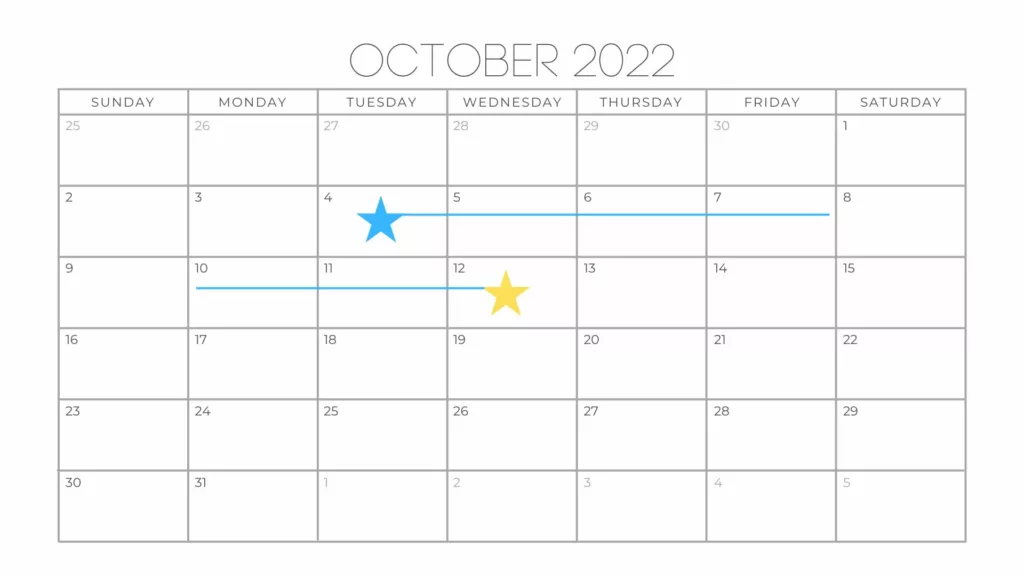
How long is 7 business days?
7 business days is a term used to refer to the period that starts on the current day and ends exactly 7 working or business days after. To be more specific, it means that all of those 7 days have to be taken into consideration (Monday-Friday) with no weekends or holidays in the middle – so it could actually take longer than a week depending on when they start and end. For example, if someone tells you on a Thursday that it will take 7 business days to complete a task, you should expect completion the following Friday.
How long is 8 business days?
8 business days is equivalent to 8 weekdays that do not include weekends or holidays. For example, if you are tasked with completed something in 8 business days and it’s a Monday, your task is due the following Wednesday. Calculating how many days are in a business week can be an important part of budgeting, as well as planning and scheduling events. Knowing how long 8 business days is can save you valuable time when you’re trying to estimate deadlines and expected delivery times for products and services.
How long is 9 business days?
9 business days is equivalent to about 18 calendar days or almost 3 full weeks. Business days refer to weekdays, so there may be shifts in time when holidays over weekends occur, since those are not included. Generally, the term ‘business day’ is used when speaking about deadlines, meetings and other activities which generally happen during regular work hours from Monday through Friday. For example, if you’re told on a Wednesday that something will take 9 business days, it will be finished Tuesday, two weeks from today.
How long is 10 business days?
Ten business days is equivalent to two full weeks of normal working days, or 14 calendar days counting weekends. Business days only include Monday through Friday and do not include Saturdays or Sundays. Any holidays that fall between the start and end dates of a 10-business-day period are not counted as part of this time frame. Knowing how long ten business days is can be very useful for planning ahead and achieving deadlines. For example, if you need more time to complete a task you can give yourself 10 business days from today’s date to ensure you meet your deadline on the tenth day. If you’re given a task on a Wednesday and told you have ten business days to complete it, it is due the Tuesday after the next week.
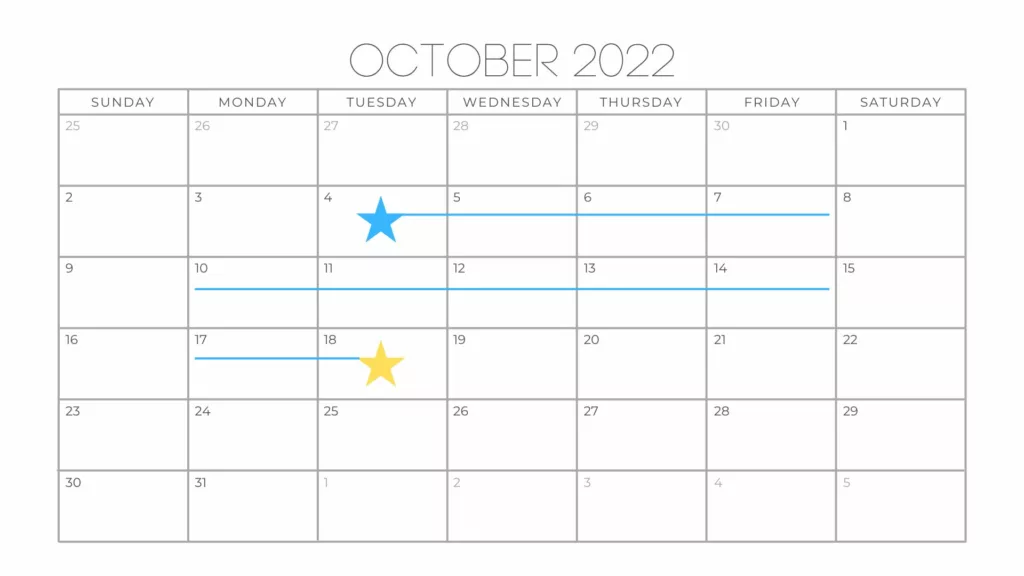
How long is 11 business days?
11 business days is the equivalent of two full weeks (10 working days) and one extra day. The key factor to remember is that consecutive business days start from Monday and exclude weekends. Knowing exactly how long 11 business days is can help you make sure you plan ahead for deadlines or tasks that need to be completed within this time frame.
In the example to the right, if you were asked to complete a task in 11 business days, and you started on October 4th, you’d finish on October 18.
How long is 12 business days?
12 business days is a term used to refer to the period that starts on the current day and ends exactly 12 working or business days after. To be more specific, it means that all of those 12 days have to be taken into consideration (Monday-Friday) with no weekends or holidays in the middle – so it would actually take longer than two weeks.
For example, if you were given a task on a Tuesday, your task is due Wednesday the week after next.
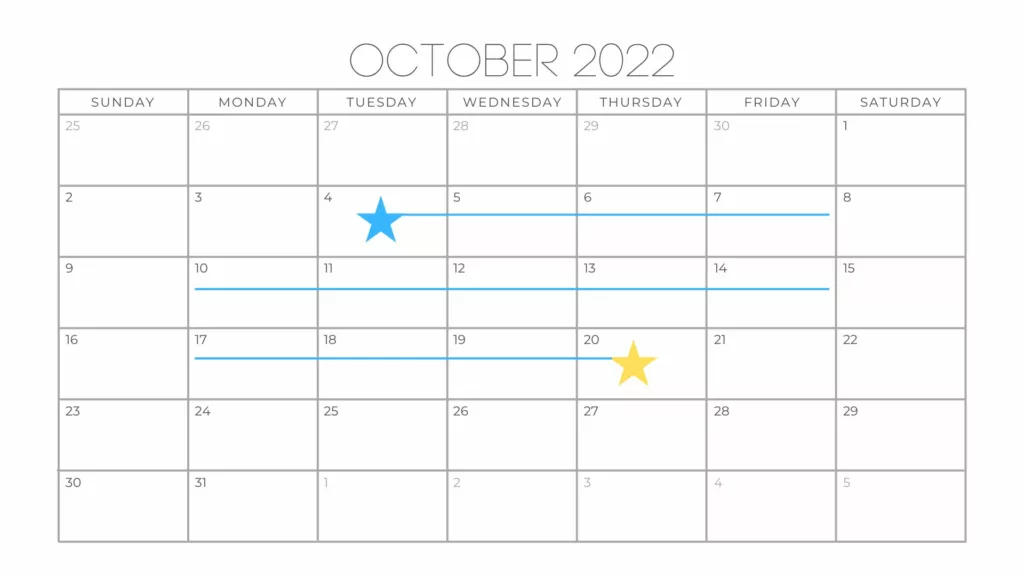
How long is 13 business days?
13 business days is equivalent to thirteen weekdays that do not include weekends or holidays. For example, if you are tasked with completed something in 13 business days and it’s a Tuesday, your task is due Thursday the week after next. Calculating how many days are in a business week can be an important part of budgeting, as well as planning and scheduling events. Knowing how long 13 business days is can save you valuable time when you’re trying to estimate deadlines and expected delivery times for products and services.
How long is 14 business days?
14 business days is equivalent to fourteen weekdays that do not include weekends or holidays. For example, if you are tasked with completed something in 14 business days and it’s a Tuesday, your task is due Friday the week after next. Calculating how many days are in a business week can be an important part of budgeting, as well as planning and scheduling events. Knowing how long 14 business days is can save you valuable time when you’re trying to estimate deadlines and expected delivery times for products and services.
How long is 15 business days?
15 business days is equivalent to fifteen weekdays that do not include weekends or holidays. For example, if you are tasked with completed something in 15 business days and it’s a Tuesday, your task is due Monday two weeks after next. Calculating how many days are in a business week can be an important part of budgeting, as well as planning and scheduling events. Knowing how long 15 business days is can save you valuable time when you’re trying to estimate deadlines and expected delivery times for products and services.
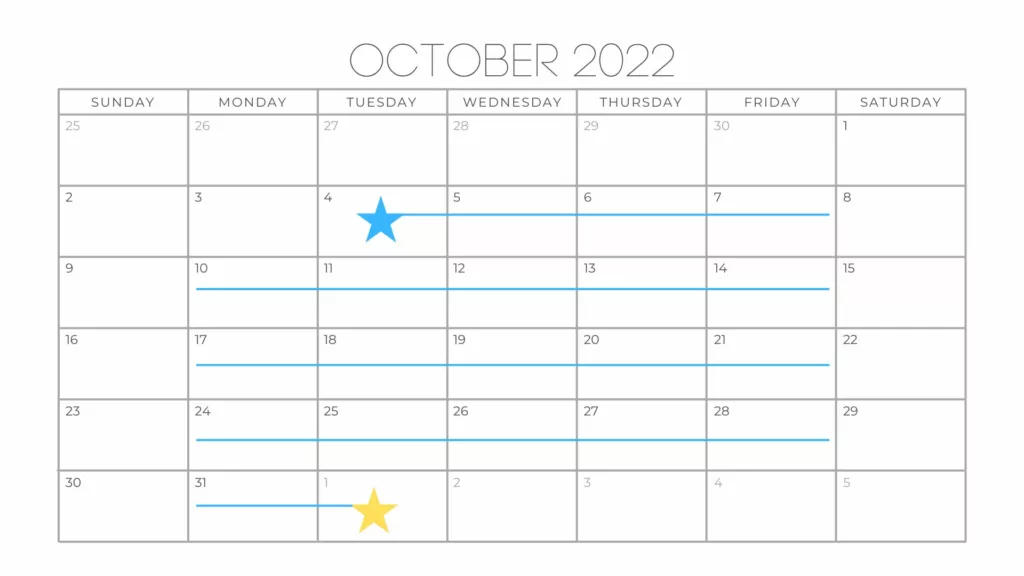
How long is 21 business days?
21 business days is equivalent to twenty one weekdays that do not include weekends or holidays. For example, if you are tasked with completed something in 21 business days and it’s a Tuesday, your task is due Tuesday three weeks after next. Calculating how many days are in a business week can be an important part of budgeting, as well as planning and scheduling events. Knowing how long 21 business days is can save you valuable time when you’re trying to estimate deadlines and expected delivery times for products and services.
How long is 1-2 business days?
For busy business people, 1-2 business days is a phrase used to describe how quickly you can expect an action to be completed. It commonly refers to the amount of time it will take for a response from a customer or client, delivery of goods, or an internal task. Typically, this means that the action will be completed within 1-2 working days (Monday – Friday) excluding weekends, holidays and other exceptions.
How long is 2-3 business days?
Two to three business days refers to either two full days or three, excluding weekends and holidays. Depending on the context, you may be referring to consecutive business days or a period of two to three business days from now. For example, if you ask your friend for a favor and they say they’ll get back to you within 2-3 business days, this means that the latest date you can expect for a response is 3 business days after the day the request was made. It could be two days later if there are intervening weekends or holidays included in the time period. Understanding what 2-3 business days typically mean will help you make sure that plans are in place and deadlines met.
How long is 3-5 business days?
The expression “3-5 business days” is often used in business when referring to a range of time. The exact number of days can vary depending on the circumstances and context. Generally, the phrase is used to refer to the amount of time it takes for a product or service to be delivered. 3-5 business days usually refers to any period between three and five working days, excluding weekends and holidays which do not count towards the day limit. Knowing this timeframe is helpful if you are eagerly awaiting an order or expecting a payment within that time frame. In most cases, “3-5 business days” translates into one full week or less – although it never hurts to double check!
How long is 4-5 business days?
When a business says that something will happen in 4-5 business days, they mean it will take four to five full days of normal business hours. To figure out the exact amount of time this is, count out four or five weekdays starting from the next day and keeping in mind that Saturdays, Sundays, and any holidays are not included within this timeframe. As an example, if you were told that something would happen in 4-5 business days on Tuesday evening, then it would occur between Friday (4 days) and Monday (5 days).
How long is 5-7 business days?
In the professional world, knowing how long 5-7 business days truly is can be quite important. Business days usually refer to all days other than weekends, national holidays, and company holidays. To figure out the exact day a task might be completed if someone says “5-7 business days,” take the date they give you and count out 5 (or 7) complete business days from that moment onward. For instance, if you are told today is Day 1 of 5-7 business days, then Day 6 would be five business days from today, and Day 8 would represent seven complete business days from now. Thus, it can generally take anywhere between one week and two weeks for an action to be completed with this timeframe.
How long is 7-10 business days?
Understanding how long 7-10 business days is can be tricky. Business days refer to the weekdays, and exclude weekends and public holidays. Depending on which time period you are referring to, 7-10 business days would be anywhere between seven and ten full working days from that given day; however, it could take anything up to two weeks for something to happen within this timeframe as holidays may affect the timeline. When providing a delivery estimation for products or services, it is important to know that 7-10 business days has a wide application in terms of what can change the expected outcome of an event’s timeline.
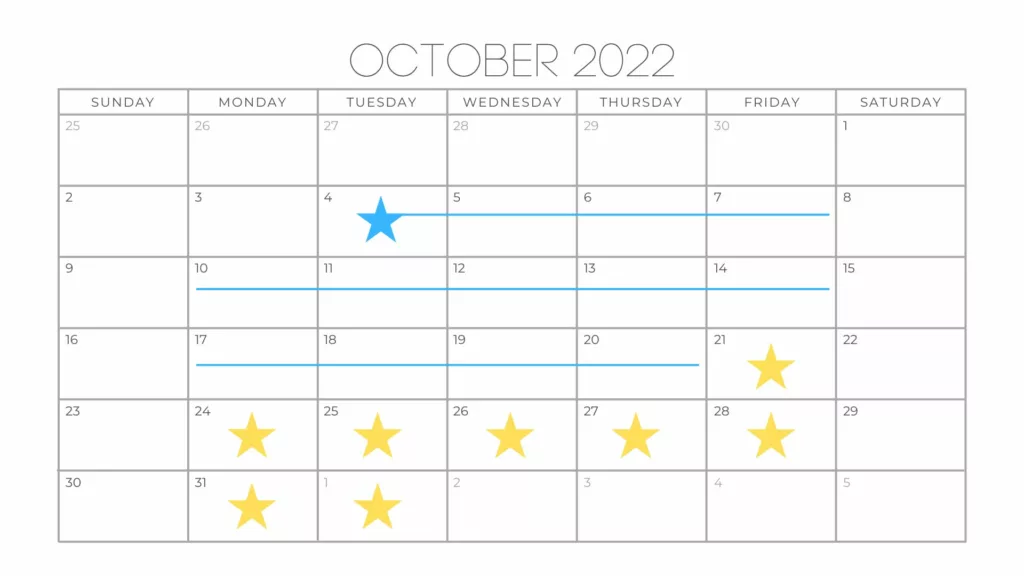
How long is 14-21 business days?
Understanding how long 14-21 business days is can be confusing and requires an understanding of the nuances between a ‘day’ and a ‘business day.’ Generally, a day is any 24 hour period including weekends; however, when looking at 14-21 business days, these are counted only from Monday through Friday. Therefore, for the example given, it would take somewhere between three to five weeks for the task to be completed. To make it easier to understand, count out the number of days on your calendar and be sure to exclude Saturday and Sunday. In most instances you can continue to dedicate each day’s efforts until completion within 5ish weeks.
How many business days in a year?
Knowing how many business days there are in a year can be an important part of running a successful business. While the exact number can vary depending on the industry, most private businesses will have just over 250 business days in a given year. Public companies, however, often calculate based on stock market calendar which can lead to anywhere between 240 and 260 days. No matter what type of business you’re running, careful attention to how many hours and how many business days makes up a year can save you a lot of time and energy down the line. Planning out specific tasks and goals for each day ensures that your hard work is being used as efficiently as possible.
To conclude, a business day is any regular 24-hour period in which businesses are open and typically conducting business. It is important to note that the length of a business day may vary depending on the region or country in which it is observed. Business days are an important factor to consider when calculating timeframes for tasks such as processing payments, submitting paperwork, and more. Understanding how long a business day lasts can help make sure you meet deadlines and effectively manage your finances.

